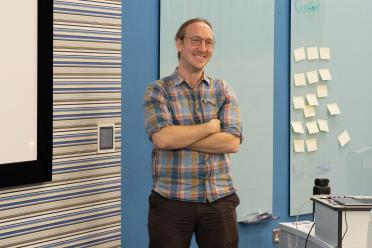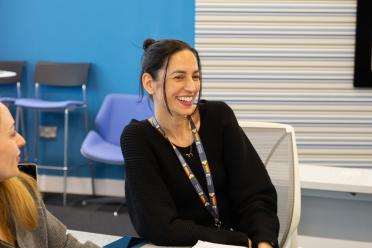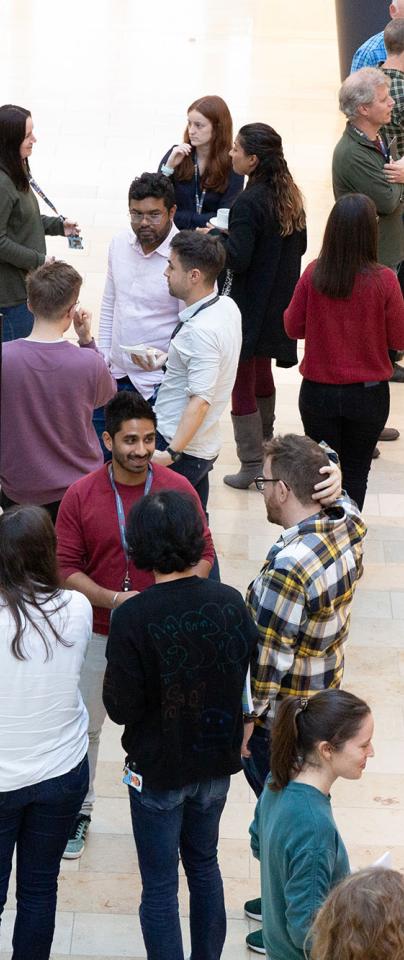Neurodiversity in research: science needs people who think differently
As an evolutionary biologist, Dr Will Nash studies the processes that give rise to biological diversity.
His work in the Haerty Group at the Earlham Institute has explored the origins and effects of genomic changes on a host of different species. Those changes, ultimately, drive adaptation and give rise to the breathtaking variety seen in life on Earth.
But he’s also passionate about growing our recognition and celebration of another kind of diversity.
Will is the accessibility champion on the Institute’s Inclusivity, Diversity, Equality, and Accessibility (IDEA) Committee and he’s part of the neurodiverse community.
Neurodiversity refers to the different ways our brains work and comes from the understanding that people will experience, process, and interact with their world in diverse ways. It’s an umbrella term used to describe alternative thinking styles such as Dyslexia, DCD (Dyspraxia), Dyscalculia, Autism, and ADHD - among others.
The Earlham Institute has recently launched a Neurodiversity Network, spearheaded by Will and with support from the IDEA Committee. The Network will link in with a new BBSRC supported project being led by the John Innes Centre - Understanding, Valuing, and Celebrating Neurodiversity.
The hope is that these nascent initiatives will see research institutes across the UK providing training, seminars, and networking opportunities, as well as sharing their experiences of working with - and for - the neurodiverse community.

For many organisations, managers, and individuals, neurodiversity is still a relatively new term. Understanding neurodiversity, what it means in a workplace, and how to meaningfully support individuals have all become important issues.
“For anyone who’s realising their brain works in a different way, neurodiversity is now far more visible and people are more able to discuss it at work or seek a diagnosis if they want to,” explains Will.
Having a formal diagnosis is not a prerequisite for joining the neurodiverse community, or for seeking support at work. But Will believes it can be an empowering step.
“Being diagnosed meant I could embrace a neurodiverse identity - one I could use to understand how my own brain works and ways I can adapt my behaviours to address those differences,” he says.
“I can also identify with a global community of people who are navigating this same identity. It’s massively helped me in both feeling connected to others and accessing support and ideas of ways to manage situations.
“I’ve always known my brain works differently. I’ve grown into the vocabulary to describe that difference and becoming formally diagnosed was a step on that path, but it wasn’t a definitive one. The important steps came afterwards, when I interacted with other neurodiverse people.”


For anyone who’s realising their brain works in a different way, neurodiversity is now far more visible and people are more able to discuss it at work or seek a diagnosis if they want to.

Dr Will Nash
For some people, being neurodiverse can have a significant impact on how they work and contribute most effectively. Understanding and accommodating those needs will help the individual to thrive on an equal footing to their neurotypical peers.
Siobhán Dorai-Raj is the Earlham Institute’s Inclusivity, Diversity, Equality and Accessibility Manager. She believes the Institute’s Neurodiversity Network - and its connection with similar UK-wide groups - will provide much-needed support for both the community and their colleagues.
“It’ll raise awareness of neurodiversity, provide support and connectivity for those who identify as neurodivergent, and also benefit anyone who wants to be more informed on how best to support their neurodiverse colleagues and friends,” she says.
“In any workplace, having people whose brains work in different ways is extremely important. This is particularly true in research. But it requires education of staff, robust policies, and a long-term view towards supporting a neurodiverse community with a wide range of needs.”
The long-term approach is something Will reiterates as essential for any organisation looking to support neurodiverse communities.
“It has taken me a long time to feel proud of my neurodivergence,” he admits.
“One of the reasons I want to raise awareness is because it was hearing other scientists, who felt comfortable presenting their neurodivergence, that helped to give me confidence.”

“I’m dyslexic and I was diagnosed as an adult,” recounts Will. “During my postgraduate studies, I made the decision to pursue a diagnosis because other members of my family had been diagnosed, I presented similar behavioural characteristics, and I was aware these conditions are often heritable.”
Dyslexia is one of the most well-known learning difficulties, often because it’s experienced or encountered at school. It mainly causes problems with reading, writing, and spelling.
These difficulties are experienced throughout an individual’s life and affect the processes used for learning, but dyslexia doesn’t affect intelligence.
According to the NHS, up to 1 in every 10 people in the UK are estimated to have some degree of dyslexia.
“I’ve always been able to create my own strategies about managing the way my symptoms present,” says Will. “For example, I benefit from having more time to prepare for meetings, looking at things in advance, and I’m a very visual person.
“I like to visualise problems and it often suits me to draw things rather than look at text or tables of numbers. Working in computational science - a technological field - also helps because I can more easily use technology to help overcome some of the challenges I might otherwise experience.”
Receiving personalised support, access to technology, and an understanding of his personal strengths and weaknesses have all helped Will to succeed - both in terms of his research but also his contribution to the Earlham Institute’s welcoming and inclusive culture.


In any workplace, having people whose brains work in different ways is extremely important. This is particularly true in research. But it requires education of staff, robust policies, and a long-term view towards supporting a neurodiverse community with a wide range of needs.

Dr Siobhán Dorai-Raj
The 18th - 24th March is Neurodiversity Celebration Week, an opportunity to raise awareness, learn from a range of resources and free seminars, and recognise the positive impact of attracting and nurturing neurodiverse people into science.
“As with all kinds of diversity, neurodiversity in the scientific community is really important,” explains Siobhan. “Representation is essential in tackling the old idea that you can’t be what you can’t see.
“Along with wider activity and initiatives, the creation of a Neurodiversity Network formally recognises the contributions of lots of different types of people - and lots of different brains - essential for solving complex scientific problems.”
The Network will provide a hub for resources, practical ideas, and provide a safe space for people to discuss neurodiversity and how they interact with it. Members will also be signposted to existing neurodiverse communities so they have the opportunity to connect with others.
“I hope it can start to capture lived experiences in a way that we can then feed back into how we train managers or develop policies and processes that support neurodiverse people,” says Will.
“Everyone benefits if we think about the different ways we approach a problem. When we can modify the environment to support those differences, we remove some of the hurdles that might hold that person back from making a full contribution.”
And, for research organisations working on some of the most urgent global challenges we face, those contributions may prove to be existentially colossal.